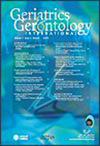Gender differences in roles of health behavior between marital status and oral health
Abstract
Aim
Marital status is a form of social network and source of social support, and it is beneficial to oral health by enhancing health behaviors. We examined the mediating effects of oral health behaviors on the association of marital status with the number of teeth.
Methods
This cross-sectional study used data from the Japan Gerontological Evaluation Study 2022, targeting individuals aged ≥65 years. Marital status was the exposure, and the number of teeth was the outcome. Mediation effects of dental treatment, dental checkup, tooth brushing, alcohol drinking, and smoking were evaluated using the Karlson–Holm–Breen (KHB) method.
Results
Of the 21 745 participants, the mean number of teeth was higher in participants having a spouse (men: 18.49 [standard deviation, SD = 10.00], women: 20.08 [SD = 8.88]) than in those without a spouse (men: 16.34 [SD = 10.34], women: 17.22 [SD = 10.35]). Having a spouse was associated with a higher number of teeth, yielding coefficients of 0.76 (95% confidence interval [CI] = 0.26; 1.25) for men and 0.67 (95% CI = 0.31; 1.03) for women, after adjusting for confounders. The coefficients for the association through oral health behaviors were 0.66 (95% CI = 0.51; 0.81) for men and 0.10 (95% CI = 0.02; 0.19) for women, explaining 46.62% of the association in men and 13.68% in women.
Conclusions
Being married at an older age was associated with having a higher number of teeth, which was mediated by better oral health behaviors. These behaviors had a greater impact on men, who generally had poorer behaviors compared with women. Geriatr Gerontol Int 2025; 25: 1397–1403.


 求助内容:
求助内容: 应助结果提醒方式:
应助结果提醒方式:


